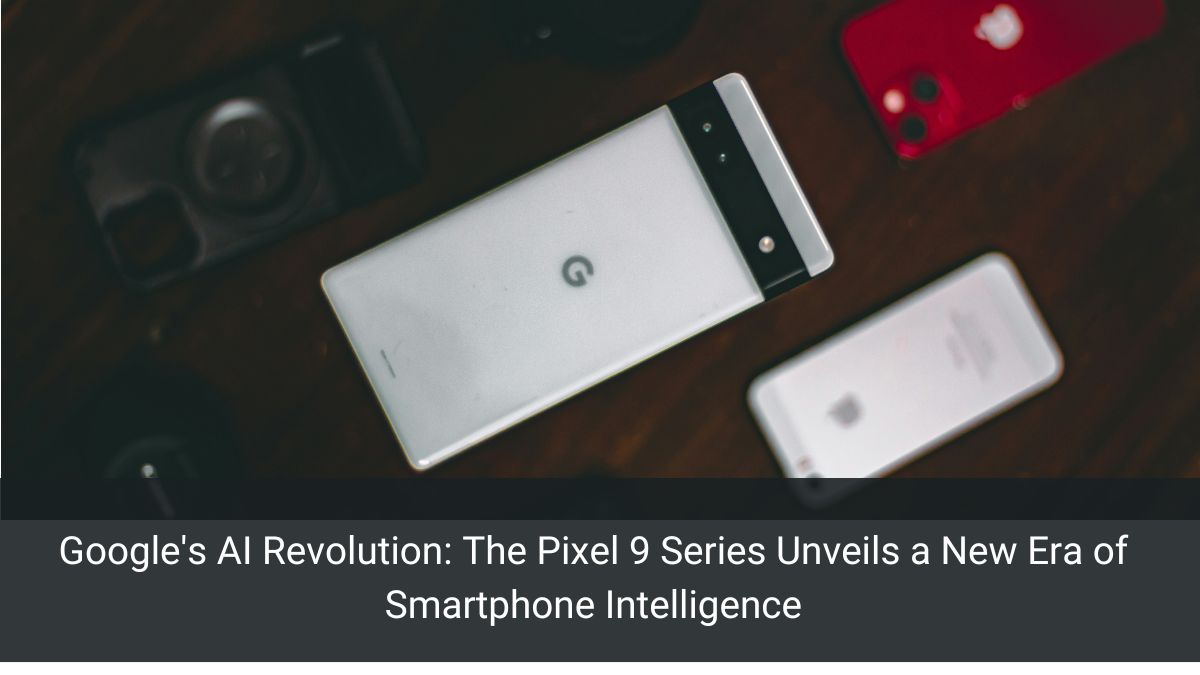AI
Google’s AI Revolution: The Pixel 9 Series Unveils a New Era of Smartphone Intelligence

The Dawn of “Google AI”: More Than Just a Catchphrase
In the ever-evolving world of smartphone technology, Google has consistently pushed the boundaries of what’s possible with artificial intelligence. As a tech enthusiast who’s owned several Pixel devices, I’ve witnessed firsthand the gradual integration of AI into our daily mobile experiences. But with the upcoming Pixel 9 series, Google is set to take a quantum leap forward, introducing a suite of features under the banner of “Google AI” that promises to redefine our relationship with our devices.
A Glimpse into the Future
According to inside sources at Google, the Pixel 9 series will debut with a mix of new and existing AI-powered features. While some, like Circle to Search and Gemini, are already familiar to Android users, it’s the new additions that have caught my attention. As someone who’s always been fascinated by the potential of AI in photography, I’m particularly intrigued by what Google has in store.
Add Me: The Evolution of Group Photos
One of the most intriguing new features is “Add Me,” which aims to ensure everyone’s included in group photos. While details are scarce, it sounds like an enhanced version of the Pixel 8’s Best Take feature. As someone who’s often behind the camera at family gatherings, I can’t count the number of times I’ve wished for a way to seamlessly insert myself into group shots.
This feature raises interesting questions about the nature of photography in the AI age. Are we capturing moments as they happened, or are we creating idealized versions of reality? It’s a philosophical debate that’s bound to intensify as these technologies become more prevalent.
Studio: Your Pocket-Sized Creative Assistant
Another exciting addition is “Studio,” which appears to be an expansion of the Creative Assistant app previously hinted at in leaks. From what we can gather, it’s not just a sticker generator but a comprehensive AI-powered image creation tool.
I remember the early days of smartphone photo editing, when adding a simple filter felt revolutionary. Now, we’re on the cusp of having a full-fledged AI art studio in our pockets. As an amateur photographer, I’m both excited and slightly intimidated by the creative possibilities this opens up.
Pixel Screenshots: A Smarter Way to Recall
Perhaps the most intriguing – and potentially controversial – new feature is Pixel Screenshots. This appears to be Google’s answer to Microsoft’s Recall feature, but with a crucial difference: it only applies to screenshots you manually capture, not everything on your screen.
Having experimented with various note-taking and information management apps over the years, I can see the appeal of a system that automatically organizes and makes searchable the information you choose to save. However, the privacy implications of such features are not to be taken lightly.
A More Thoughtful Approach to Data Collection
Google’s implementation of this feature seems more privacy-conscious than Microsoft’s initial attempt. By limiting it to user-initiated screenshots and processing the data locally, Google appears to be striking a balance between functionality and privacy.
As someone who values both the convenience of modern technology and the sanctity of personal data, I appreciate Google’s more measured approach. It’s a reminder that with great power comes great responsibility, especially when it comes to AI and data handling.
The Bigger Picture: AI’s Growing Role in Our Digital Lives
The introduction of these new features under the “Google AI” umbrella is more than just a marketing strategy. It’s a clear signal of where Google sees the future of smartphone technology heading. As AI becomes more sophisticated and more deeply integrated into our devices, the line between human and machine intelligence continues to blur.
The Promise and Perils of AI Integration
On one hand, these advancements promise to make our digital lives more efficient and our devices more helpful. Imagine never missing out on a group photo or being able to instantly find that snippet of information you screenshotted weeks ago.
On the other hand, as AI takes on more tasks, we must remain vigilant about issues of privacy, data security, and the potential for over-reliance on technology. It’s a delicate balance that we, as users, will need to navigate carefully.
Looking Ahead: The Future of Smartphone AI
As we stand on the brink of this new era in smartphone intelligence, it’s worth considering what the future might hold. Will we see even more advanced AI features in the Pixel 10 or 11? How will other manufacturers respond to Google’s AI push?
More importantly, how will these advancements change the way we interact with our devices and with each other? As someone who’s witnessed the smartphone revolution from its early days, I’m both excited and slightly apprehensive about the road ahead.
A Call to Mindful Innovation
As we embrace these new AI-powered features, it’s crucial that we do so with open eyes and critical minds. We should celebrate the innovations that genuinely improve our lives while being mindful of the potential drawbacks.
To my fellow tech enthusiasts and Pixel users, I encourage you to explore these new features when they arrive. Push them to their limits, but also question their implications. Share your experiences, both positive and negative. It’s through this collective exploration and discussion that we can help shape the future of smartphone AI in a way that serves humanity’s best interests.
What are your thoughts on Google’s AI push? Are you excited about these new features, or do you have reservations? Let’s keep the conversation going and ensure that as our devices get smarter, we do too.
